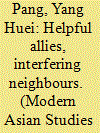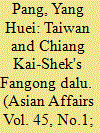|
|
|
Sort Order |
|
|
|
Items / Page
|
|
|
|
|
|
|
| Srl | Item |
| 1 |
ID:
139670


|
|
|
|
|
| Summary/Abstract |
In the aftermath of the Korean War, the People’s Republic of China was effectively an international pariah. Accounts of this period in Chinese textbooks emphasize how the Chinese turned this around, either during the Geneva Conference or the Bandung Conference, through deft planning and enterprise. Yet few pay any attention to how such manipulation of world opinion became increasingly difficult for Beijing after that initial success. One outcome of
China’s public relations campaign meant friendly Afro-Asia leaders voiced their opinions, in alarming numbers, to their Chinese counterparts regarding issues such as Asian security,mainland China’s economic development, and the Taiwan problem. Indeed, recently declassifiedChinese Foreign Affairs archive documents demonstrate that China tried to marshal such non-Soviet bloc opinions to its advantage during the first Taiwan Strait crisis (1955). Chinese efforts were successful in that there was no lack of volunteers to air dissent with American foreign policy. But these new allies also wished to mediate between the United
States and the Republic of China, on the one side, and mainland China on the other. Moreover, such efforts were often at variance with China’s domestic and strategic outlook in the region. China thus had to embark upon an active ‘management’ of disparate world opinions, which was an entirely new endeavour. Although China tried to provide a sanitized ‘script’ for its new friends, most had their own ideas. By the time of the second Taiwan Strait crisis (1958), the
volume of third party interference had grown.Overwhelmed by such international attention, China responded by openly rejecting unwelcomemediation efforts and demanded outright condemnation of the United States. Thus, ironically, with its growing prominence on the international stage, China found itself unbearably weighted down by the burden of world opinion, a position previously occupied by the United States.
|
|
|
|
|
|
|
|
|
|
|
|
|
|
|
|
| 2 |
ID:
128032


|
|
|
|
|
| Publication |
2014.
|
| Summary/Abstract |
For much of the 1950s, ROC President Chiang Kai-shek tried to formulate viable "counteroffensive" plans to reclaim mainland China. A main part of this vision was to attract US military sponsorship; for the ROC conspicuously lacked the military strength to reconquer mainland China. However, the formulation of these plans had unintended results for Taiwan. Firstly, the military plans gave Chiang's subordinates an indirect way of stating the impossibility of returning to mainland China, while strenuously proclaiming their loyalty. Secondly, Chiang Kai-shek's admonishment "????" Wu Wang Zai Ju (Forget Not the time at Ju), the clarion call for the ROC's mainland counter offensive, unwittingly promoted a more sedentary form of national identity for the average Taiwanese. Finally, the more Taiwan developed economically by means of US aid, the more the Taiwanese silently distanced themselves from Chiang's Quixotic dream of reclaiming mainland China. Thus, Chiang's leadership in "counteroffensive" planning did more to distance the island state from the mainland than "reclaim" it.
|
|
|
|
|
|
|
|
|
|
|
|
|
|
|
|
|
|
|
|
|